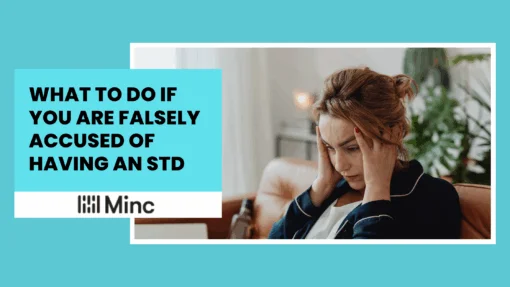
- Originally Published on May 12, 2025
What to Do If Someone Falsely Claims You Have an STD or STI
Being falsely accused of having a sexually transmitted disease can devastate your personal relationships, damage your reputation, and cause significant emotional distress. These harmful accusations may constitute defamation and, specifically, what the law recognizes as “defamation per se,” providing you with important legal remedies.
In this article, the defamation team at Minc Law examines the legal options available to those who have been falsely accused of having an STD and outlines practical steps you can take to protect yourself and your reputation.
Understanding the Legal Nature of False STD Accusations
When someone falsely claims you have an STD, this statement may qualify as defamation – a false statement that harms your reputation. To establish a claim for defamation based on false STD accusations, you must generally prove:
- A false statement of fact (that you have an STD when you do not)
- About you
- Communicated to at least one other person
- Made with at least negligence
- The statement caused harm to your reputation
The fifth element – proving harm – is where false STD accusations take on particular significance. In most jurisdictions, falsely claiming someone has an STD falls under a special category called “defamation per se,” which means the statement is considered so inherently harmful that damage to your reputation is presumed without requiring specific proof.
Why False STD Accusations Are Typically Considered Defamation Per Se
The law recognizes that certain types of false statements are so damaging to a person’s reputation that harm is presumed to result from the mere making of the statement. False claims that someone has a “loathsome disease” – which typically includes sexually transmitted diseases – have historically been recognized as one such category.
When a statement qualifies as defamation per se, you are relieved of the burden of proving actual damages. This is a significant advantage in defamation litigation, as proving specific damages can otherwise be challenging and invasive.
The rationale behind classifying false STD accusations as defamation per se is straightforward: such accusations can immediately damage your most intimate relationships, subject you to social stigma, and cause others to avoid contact with you – all harms that are presumed to naturally flow from such accusations.
Immediate Steps to Take When Falsely Accused
If you discover someone is falsely claiming you have an STD, taking prompt action is essential:
Document All Instances of the False Claim
Begin collecting evidence immediately. Preserve text messages, emails, social media posts, or any other communications containing the false accusations. For verbal statements, document the date, location, content, and any witnesses present. This contemporaneous documentation will be valuable if legal action becomes necessary.
Consider Medical Documentation
While this involves your private medical information, obtaining documentation confirming you do not have the STD in question may be important evidence if you pursue legal action. Consult with your healthcare provider about appropriate testing and documentation.
Limit Your Response
Exercise discretion when responding to the accusations. Limit discussions about the matter to those who need to know, and maintain a factual, non-emotional approach. Widespread discussion of the accusations, even in your own defense, may inadvertently amplify the false information.
Legal Options for Addressing False STD Accusations
If the false accusations persist or have already caused significant harm, legal intervention may be necessary:
Retraction Demand or Cease and Desist Letter
Having an attorney send a formal retraction demand or cease and desist letter is often an effective first legal step. This formal communication puts the accuser on notice that their statements are false and potentially actionable under defamation law. It demands they stop making the false claims, retract previous statements, and may request other remedial actions.
Defamation Lawsuit
When other approaches fail, filing a defamation lawsuit may be necessary. Because false STD accusations typically qualify as defamation per se, you generally don’t need to prove specific financial damages to recover compensation. The lawsuit process allows for formal discovery of evidence and witness testimony to establish the falsity of the claims.
When to Consult an Attorney
Given the complex nature of defamation law and the sensitive subject matter involved in false STD accusations, consulting with an attorney experienced in defamation matters is advisable. An attorney can:
- Evaluate the specific circumstances of your case
- Advise on the applicable law in your jurisdiction
- Recommend the most appropriate course of action
- Help protect your privacy throughout the legal process
Minc Law Can Help
False accusations about having an STD can be deeply distressing and damaging to your reputation. However, the law recognizes the serious nature of such accusations through the doctrine of defamation per se, which provides important legal remedies.
By understanding your legal rights, documenting the false statements, and consulting with experienced legal counsel, you can take effective action to protect your reputation and seek appropriate remedies for the harm caused by false STD accusations.
If you’re facing false accusations about having an STD, contact the experienced attorneys at Minc Law. Our team understands the sensitive nature of these cases and can help you explore your options while protecting your privacy. Call (216) 373-7706 or fill our the form below to get started.
Get Your Free Case Review
Fill out the form below, and our team will review your information to discuss the best options for your situation.
This page has been peer-reviewed, fact-checked, and edited by qualified attorneys to ensure substantive accuracy and coverage.
